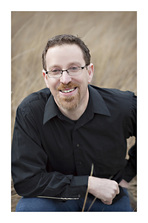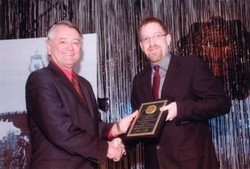About Jack Russell Weinstein

Dr. Jack Russell Weinstein is a Chester Fritz Distinguished Professor of Philosophy and the Director of the Institute for Philosophy in Public Life, at the University of North Dakota. He is the host of the public radio show and podcast Why? Philosophical discussions about everyday life (WHY? Radio for short), currently in its twelfth season. He is the author of three books and dozens of articles, and has edited six collections.
Professor Weinstein is the recipient of the 2007 UND Foundation/McDermxott Award for Individual Excellence in Teaching, the top teaching award at his university. He received his Ph.D. in philosophy from Boston University in 1998. He is the author of three books On Adam Smith and On MacIntyre, both volumes in the Wadsworth Philosophers Series, and most recently Adam Smith's Pluralism: Rationality, Education, and the Moral Sentiments, from Yale University Press.
Weinstein was born and raised in Washington Heights, in New York City. He has lived in upstate New York, Boston, New Jersey, Kentucky, California, and Vienna, Austria, before settling in Grand Forks, North Dakota. He is married to Kim Donehower, an English professor, with whom he has a daughter Adina, and a dog, Oscar. He is an avid bread baker and an amateur triathlete, plays guitar, and briefly aspired to be a photographer. He was, much to his students’ surprise, deeply involved in the 1980s punk and ska scenes in New York City and a ska D.J. during college. He still deejays "Ska and Waffles" events in Grand Forks; Weinstein has always loved the romance of radio.
Professor Weinstein is the recipient of the 2007 UND Foundation/McDermxott Award for Individual Excellence in Teaching, the top teaching award at his university. He received his Ph.D. in philosophy from Boston University in 1998. He is the author of three books On Adam Smith and On MacIntyre, both volumes in the Wadsworth Philosophers Series, and most recently Adam Smith's Pluralism: Rationality, Education, and the Moral Sentiments, from Yale University Press.
Weinstein was born and raised in Washington Heights, in New York City. He has lived in upstate New York, Boston, New Jersey, Kentucky, California, and Vienna, Austria, before settling in Grand Forks, North Dakota. He is married to Kim Donehower, an English professor, with whom he has a daughter Adina, and a dog, Oscar. He is an avid bread baker and an amateur triathlete, plays guitar, and briefly aspired to be a photographer. He was, much to his students’ surprise, deeply involved in the 1980s punk and ska scenes in New York City and a ska D.J. during college. He still deejays "Ska and Waffles" events in Grand Forks; Weinstein has always loved the romance of radio.

There are two threads to Weinstein’s career. The first is his specialized work, which focuses on the intersection of the history of philosophy and contemporary political theory. His main interest is in theories of diversity and justice, with special attention to education and otherness, human rationality, and the roles of emotion in moral judgment. Much of this work revolves around Adam Smith, the father of modern economic theory. Weinstein seeks to show that Smith's political economy is a more focused instance of Smith's general moral theory, and that Smith still has much to say about today’s world. He is currently writing the second installment of a three-volume political theory that pays special attention to the role of education in a pluralist society.
The other thread in Weinstein’s career emphasizes creating and cultivating a large-scale philosophical discussion with non-academic audiences. Two of his books are written for non-specialists, as is his radio show and blog. Weinstein has published columns in newspapers, conducted live interviews everywhere from formal auditoriums in front of thousands of people, to obscure music clubs in China, to cafes in Vienna, to people’s living rooms. He believes that public philosophy is not a different discipline from academic philosophy. It's just practiced by amateurs rather than professionals. Ultimately, public philosophy represents a translation problem. Public philosophers have to find the right words and present them in the right way. He is committed to the principle that all ideas can be explained to all people.
The other thread in Weinstein’s career emphasizes creating and cultivating a large-scale philosophical discussion with non-academic audiences. Two of his books are written for non-specialists, as is his radio show and blog. Weinstein has published columns in newspapers, conducted live interviews everywhere from formal auditoriums in front of thousands of people, to obscure music clubs in China, to cafes in Vienna, to people’s living rooms. He believes that public philosophy is not a different discipline from academic philosophy. It's just practiced by amateurs rather than professionals. Ultimately, public philosophy represents a translation problem. Public philosophers have to find the right words and present them in the right way. He is committed to the principle that all ideas can be explained to all people.

Weinstein’s approach to consulting is to see it as the overlap between his specialized work and his public philosophy. By finding general terms to discuss philosophy, but immersing himself in the methods and vocabulary of consultants with flexible expertise, Weinstein is able to help clients create a long-term framework for their own ethical inquiries. They can take philosophy with them and become better, more ethical, more sympathetic specialists, who work in a better, more ethical, more sympathetic consulting firm.
Dr. Weinstein teaches doctoral courses for the Department of Moral and Social Philosophy at the University of Helsinki and has held visiting fellowships or guest professorships at The Center for Scottish Studies at Princeton Theological Seminary, Die Institut fuer die Wissenschaften vom Menschen, The State University of New York, Plattsburgh (his undergraduate alma mater), Oklahoma State University, and the University of Oulu.
Dr. Weinstein teaches doctoral courses for the Department of Moral and Social Philosophy at the University of Helsinki and has held visiting fellowships or guest professorships at The Center for Scottish Studies at Princeton Theological Seminary, Die Institut fuer die Wissenschaften vom Menschen, The State University of New York, Plattsburgh (his undergraduate alma mater), Oklahoma State University, and the University of Oulu.
